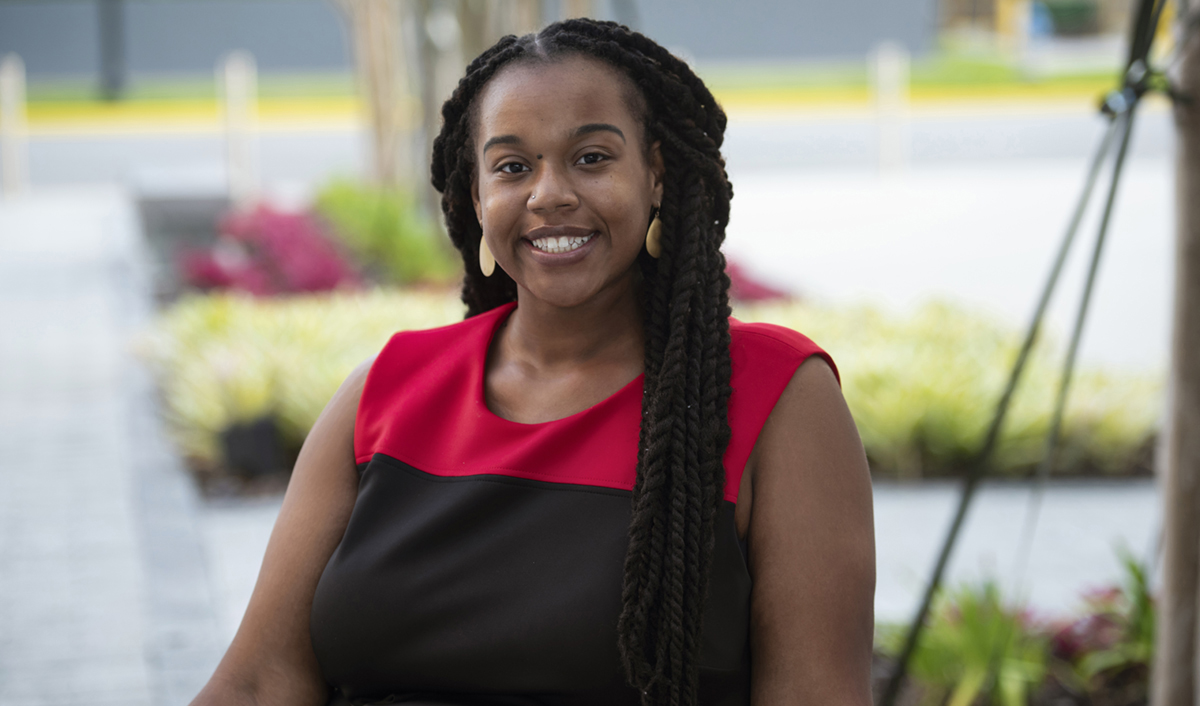The Master of Public Administration program prepares students to lead more holistic and lasting change.

After graduation, Atiyah Appline '20 wants to work for the U.S. Department of Housing and Urban Development and eventually run for office. (Photo by Amy Floyd)
Atiyah Appline '20 has been a longtime advocate for social justice. But it was on a 2019 UCF Perspectives trip to Israel and the West Bank that she learned just how much legislation and policy impacts communities. Central Florida Hillel led the group of mostly non-Jewish student leaders chosen to study the Israeli-Palestinian conflict and meet with people in the region, including high-ranking officials and lawmakers. An undergraduate student at the time, Appline returned to the United States understanding something about herself and her advocacy.
"It was one thing to protest for change, but another to write change into law. Although we need both, I realized I have a passion for writing legislation – not only to speak about it but to write it and get my point across."
Appline knew she wanted to have an impact on policy, so after completing her bachelor's degree in social work at UCF, she began her graduate studies in the Master of Public Administration program. The graduate program is designed to prepare leaders for public service and advance their knowledge in the field. Students explore a wide range of disciplines, including legislative management and administration, policy analysis, strategic leadership in the public sector, economic development, social equity and ethical practice.
In addition to her graduate studies, Appline works as a housing stability case manager at a Seminole County shelter for people experiencing homelessness, where she sees firsthand the effects of the affordable housing crisis. Appline says her clients come from a variety of backgrounds. For some, homelessness began on the other side of the country. For others, they are survivors of domestic violence. And still others have experienced homelessness on and off their whole lives.
"Everyone deserves to have their most basic needs met including shelter, food and love. When you don't have any one of those foundational needs met, everything else crumbles. You can't build a house with half a foundation."
Appline says the graduate program prepares students to consider the impact of their decisions in this work and, above all, to do no harm. For instance, when she reviewed a grant to build affordable housing through her work in the shelter, she shared her thoughts on the importance of employment opportunities nearby for the individuals and families they hope to support.
“I noticed that the location of the affordable housing would be far from any employment for our clients, whose access to transportation is limited. Accessible employment opportunities are key to helping our clients maintain or improve their housing stability, an important part of what we do.”
Everyone deserves to have their most basic needs met including shelter, food and love. When you don't have any one of those foundational needs met, everything else crumbles. You can't build a house with half a foundation.
Atiyah Appline '20
While busy juggling school and work, Appline appreciates what she has learned while applying her graduate studies to her role at the shelter. She says the program has given her confidence to question things she never had before, and the opportunity to have a greater impact on the lives of her clients.
Appline says she looks more holistically at the issues they face. “Many of my clients fall into the senior category and their only income is $400 a month for social security. How can you afford a one-bedroom apartment when rent for that apartment at 'fair market value' is over $1100 a month?”
Affordable housing was already in crisis before the pandemic, says Appline. "And for those unable to come up with the cost of housing, especially because of lost wages and jobs due to the pandemic, many more are coming to us for help. Too many times we are forced to turn people away – that means seniors, families and other people sleeping in cars or on the streets."
Appline says after graduation, she would like to work for the Department of Housing and Urban Development and eventually run for public office. If elected, she says the first item on her agenda would be to focus on changing the laws for Section 8 Housing. She says these laws limit where affordable housing can exist and fail to provide more sustainable support and protection to individuals and families in need of housing.
Many vulnerable communities are without housing as a result of policies Appline would like to change. “While there are programs and laws intended to protect these communities, you’ll find property owners working around these protections.”
Appline says that is why she will keep looking for ways to make a lasting impact and better serve communities facing housing instability and homelessness.
"You've got to do what's right. I didn't go into this field for myself, but to make sure that my generation has a positive impact on the next generation – and so that generation has an even greater impact on the generations that follow.”